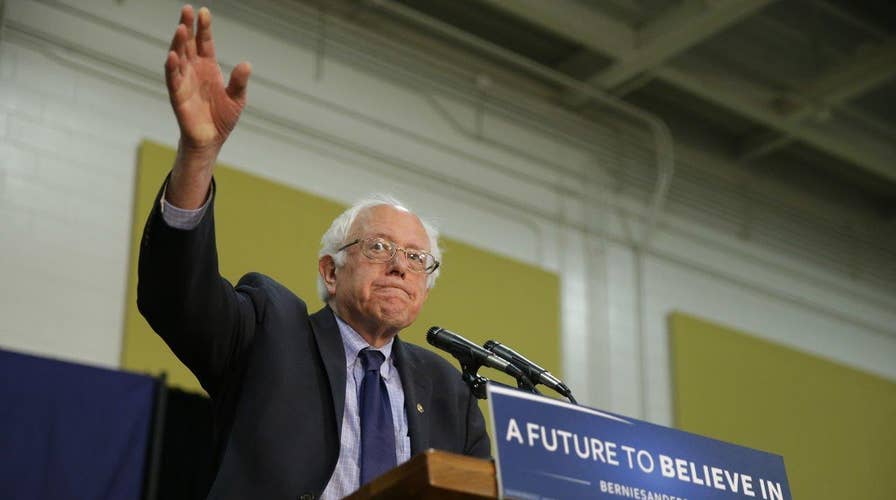The role Sanders could play at Democratic convention
Strategy Room: Ellen Ratner and Adam Goodman discuss Sanders' motives for staying in the race
Slowly but surely, Vermont Sen. Bernie Sanders seems to be acknowledging Hillary Clinton enjoys a relatively clear path to the Democratic nomination – which begs the question, why is he still in the race?
While the underdog presidential candidate insists he’s still in it to win it, he is also dropping hints that he has other long-term goals in mind. Namely, to use his delegate leverage to ultimately change the party platform, and even the nominating process itself, at the convention.
The senator referenced that strategy at a rally in Indiana Wednesday, saying that if he can’t win, “We're going to have the votes to put together the strongest progressive agenda that any political party has ever seen.”
The rhetorical shift comes as the Sanders campaign begins to scale back in the final stretch, after the senator lost four of the five states that voted this past Tuesday. The campaign confirmed Wednesday that "hundreds" of field staff from those states were told they are being let go.
Communications director Michael Briggs said the changes are part of "right-sizing" the campaign after the elections.
“We will continue to have a strong and dedicated staff of more than 300 workers who are going to help us win in California and other contests still to come,” Briggs said in a statement. “This campaign believes that we have a path toward victory and we’re going to marshal our resources to do everything we can to win the Democratic nomination.”
Sanders also said Wednesday that he realizes he’s behind in delegates, “But you know what: unusual things happen in politics.”
Still, Politico reports that Sanders aides have been in contact with Democratic National Convention organizers to talk about logistics in July, and are considering pursuing party platform changes and reforms to the nominating process.
The report said this could include changes in the use of closed primaries – primaries where independents cannot vote, a system Sanders has complained about – and the role of superdelegates. Superdelegates are party insiders and officials free to vote for whomever they want; they have mostly backed Clinton in the 2016 race.
As for changes to the party platform, the candidate's Tuesday-night statement could offer a guide. In it, he said the campaign would go to Philadelphia “with as many delegates as possible to fight for a progressive party platform that calls for a $15 an hour minimum wage, an end to our disastrous trade policies, a Medicare-for-all health care system, breaking up Wall Street financial institutions, ending fracking in our country, making public colleges and universities tuition free and passing a carbon tax so we can effectively address the planetary crisis of climate change."
Counting superdelegates, Clinton now has 2,165 delegates on her side. Sanders has 1,357. It takes 2,383 to clinch the nomination.
While Sanders weighs his options, Clinton is increasingly turning her attention and criticism toward Republican front-runner Donald Trump.
After he accused her of playing the “woman card,” she countered: “If fighting for women's health care and paid family leave and equal pay is playing the woman card, then deal me in.”
The Clinton campaign, though, denies it is fully pivoting to the general election and says it respects Sanders' decision to continue.
Fox News’ Ed Henry and Rich Edson contributed to this report.





